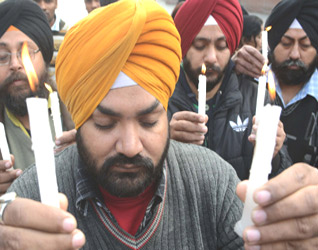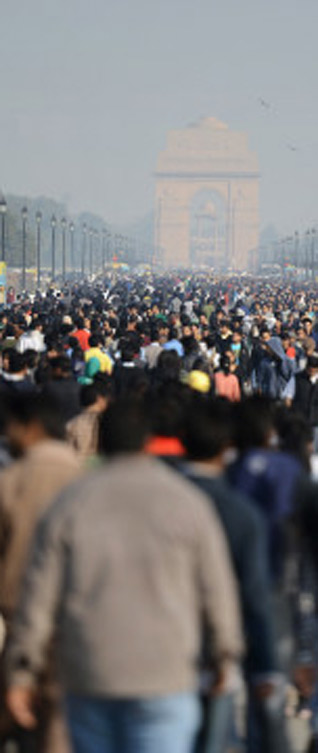Current Events
An Area of Darkness:
Life For India's Women Today
URVASHI BUTALIA
As I write this, there are protests going on all over Delhi, India, and in other parts of the country, against the gang-rape of a young woman on a moving bus a few days ago in the city.
People are out there in large numbers -- young, old, male, female, rich, poor -- and they’re angry. They want the rapists to be caught, they want them to be taught a lesson, many are suggesting they should be hanged, or castrated, but also that the State should act, bring in effective laws, fast track courts, police procedures and more.
Not since the Mathura rape case have there been such widespread protests. The difference is that then, it was mainly women’s groups who were protesting; today’s protests are more diverse. Sometimes, tragically, it takes a case like this to awaken public consciousness, to make people realise that rape and sexual assault are not merely ‘women’s issues,’ they’re a symbol of the deep-seated violence that women -- and other marginalised people -- experience every day in our society.
At a time when every politician, no matter what colour, is crying foul, every judge and lawyer, no matter what their loyalties, is joining the chorus, every policeperson, no matter from where, is adding his/her voice, it is worth remembering some key things.
First, more than 90 per cent of rapes are committed by people known to the victim/survivor, a staggering number of rapists are family members. When we demand the death penalty, do we mean therefore that we should kill large numbers of uncles, fathers, brothers, husbands, neighbours? How many of us would even report cases of rape then? What we’re seeing now -- the slow, painful increase in even reports being filed -- will all disappear.
Second, the death penalty has never been a deterrent against anything -- where, for example, is the evidence that death penalties have reduced the incidence of murders? Quite apart from the fact that the State should never be given the right to take life, there is an argument to be made that imposing the death penalty will further reduce the rate of conviction, as no judge will award it.
Then, and this is something that women’s groups grasped long ago: a large number of rapes are committed in custody, many of these by the police.
Mathura was raped by two policemen, Rameezabee was raped inside a police station by police personnel, Suman Rani was raped by policemen. There are countless other cases: will we hang all police rapists? Put together, that’s a lot of people to hang.
Police action is, in fact, one of the demands. Yet, the police’s record, whether in recording cases or in conducting investigations, is nothing to write home about.
On a recent television show, a police officer put his finger on it when he said: how can we expect that police personnel, who are, after all, made of the same stuff as the men who gang-raped the young woman last week, to suddenly and miraculously behave differently?
I was reminded of a study done by a local newsmagazine not so long ago of the attitudes of high ranking police officers in Delhi about rape. Roughly 90 per cent of them felt the woman deserved it, that she asked for it, that she should not have been out alone, or should not have been dressed in a particular fashion.
Strange that women’s bodies should invite such reactions -- could it be that the problem is in the eye of the beholder? Why, for example, does it seem to be more ‘legitimate’ for women to be out during daylight hours, but not at night?
Lawyers and judges too have joined the protests -- and this is all to the good for the more diverse the protests, the more impact they will have.
But it’s lawyers who use every ruse in the book to allow rapists to get away, judges who make concessions because the rapists are ‘young men who have their whole lives in front of them’ and so on.
Do women’s lives not have a value then?
And then there are our politicians.
Perhaps we need to ask how many politicians have rape cases, or allegations of rape pending against them. Perhaps we need to ask why no one is asking this question: that here you have an elected politician -- Narendra Modi, your next prime ministerial candidate -- someone under whose rule Muslim women in Gujarat were not only subjected to horrendous rape but also to equally dreadful violence.
How can we, how can the media, how can journalists -- all of whom are lauding the success of this politician, how can they not raise, and particularly at this time, the question of his sanctioning, encouraging the use of rape as a weapon of war?
And more, we need to ask: if the politicians are indeed serious about this issue, why are they not out there with the protestors? When Anna Hazare was fasting, there wasn’t a day that went by when one or other politician did not go to see him. Where are they now?
Rape happens everywhere: it happens inside homes, in families, in neighbourhoods, in police stations, in towns and cities, in villages, and its incidence increases, as is happening in India, as society goes through change, as women’s roles begin to change, as economies slow down and the slice of the pie becomes smaller -- and it is connected to all these things. Just as it is integrally and fundamentally connected to the disregard, and indeed the hatred, for females that is so evident in the killing of female foetuses.
For so widespread a crime, band aid solutions are not the answer.
Protest is important, it shakes the conscience of society, it brings people close to change, it makes them feel part of the change. And there is a good chance that the current wave of protests will lead to at least some results -- perhaps even just fast track courts.
But perspective is also important: we need to ask ourselves: if it had been the army in Manipur or Kashmir who had been the rapists, would we have protested in quite the same way? Very likely not, for there nationalism enters the picture.
Remember Kunan Posphpora in the late nineties when the Rajasthan Rifles raped over 30 women? Even our liberal journalists found it difficult to credit that this could have happened, that the army could have been capable of this, and yet, the people of Kunan Poshpora know. Even today, women from this area find it difficult to marry -- stigma has a long life.
Would we have been as angry if the rape had taken place in a small town near Delhi and the victim had been Dalit?
Remember Khairlanji? Why did that rape, of a mother and her daughter, gruesome, violent, heinous, and their subsequent murder not touch our consciences in quite the same way?
It is important to raise our collective voice against rape. But rape is not something that occurs by itself. It is part of the continuing and embedded violence in society that targets women on a daily basis. Let’s raise our voices against such violence and let’s ask ourselves how we, in our daily actions, in our thoughts, contribute to this, rather than assume that the solution lies with someone else. Let’s ask ourselves how we, our society, we as people, create and sustain the mindset that leads to rape, how we make our men so violent, how we insult our women so regularly, let’s ask ourselves how privilege creates violence.
It is important we raise our collective voice for women, but let’s raise it for all women, let’s raise it so that no woman, no matter that she be poor, rich, urban, rural, Dalit, Muslim, Hindu, or whatever, ever, in the future, has to face sexual violence, and no man assumes that because of the system and people’s mindsets, he can simply get away with it.
And let’s raise it also for men, for transgenders, for the poor -- all those who become targets of violence. Let’s not forget that the young rape survivor in Delhi was accompanied by a friend who too was subjected to violence and nearly killed. Let’s talk about him too.
(Urvashi Butalia is a feminist writer and founder of Zubaan, an independent non-profit publishing house.)
[Courtesy: The Hindu newspaper.]
December 30, 2012
Conversation about this article
1: Kanwarjeet Singh (USA), December 30, 2012, 9:33 AM.
Amazing - she goes through the entire list but conveniently forgets the rapes of 1984, the rapes of Sikh women throughout the 1980s and 90s by Indian and Punjab police and the Indian Army in the name of fighting terrorism (read, wiping out Sikhs). She keeps on and on but does not award a single sentence to what her Hindu forefathers did when Abdali was kidnapping their women and how Sikhs protected them; how then the Hindus resigned to fate rejected these 'impure' women. Any Sikh who feels these non-Sikh Indians feel your pain are grossly mistaken. I think the biggest blunder we Sikhs made was to stand up for these traitors.
2: H. Kaur (Canada), December 30, 2012, 10:44 AM.
How disappointing that she did not mention the tens of thousands of Sikh victims. She also didn't mention the Christian women who continue to get raped and paraded naked by Hindu radicals. Interestingly, these radicals never get punished by the courts in spite of the raping and murdering. The Congress government has its own death and gang rape squads for minorities and so does the BJP. Between the two, what minority is safe?
3: G C Singh (USA), December 30, 2012, 4:41 PM.
While the Sikh nation deeply sympathizes with the victim's family for this horrible act of violence, we are totally in shock at the complete silence and hypocrisy of the entire Hindu establishment and population over the officially sanctioned rape and ghastly treatment of thousands of Sikh women in Delhi and the rest of India in 1984 and the decade that followed. Indira Gandhi, who initiated the genocide of Sikhs in Punjab, gave Indian security forces official sanction for the rape, humiliation and torture of Sikh women in India's dungeons. But she is revered as Mother India and her place of cremation is now a national monument known as "Shakti Sthal", meaning the 'place of strength and power'. Her son Rajiv Gandhi, who within hours of taking over political power, organized the mass murder of tens of thousands of innocent Sikhs and gruesome rape of thousands of Sikh women in the largest pogrom in the history of free India, was immediately rewarded for his "courageous deeds" by Hindu voters who elected this apprentice politician as the Prime Minister of the second most populous nation in the world. He is officially touted as the "young visionary leader of India" and his place of cremation is a national monument known as 'Vir Bhumi' - meaning the "Land of the Brave". Narendera Modi, Chief Minister of Gujarat, who conducted the mass murder of 3000 Muslims and rape of their women in the run-up to state elections, is now the latest "Indian Hero" who is being projected as the next Prime Minister of "Shining India". The Indian army has routinely used rape as a weapon of choice against minorities, Dalits, Adivasis and all those from Nagaland to Kashmir who have demanded freedom and justice from the oppressive, corrupt, criminal and thuggish Indian ruling class. Indians can protest all they want, but unless they face the stark reality and deal with the top echelons of the criminals who hold real political power and are comfortably ensconced in Cabinet, Parliament, State assemblies , army, paramilitary forces, police and Indian intelligence agencies, and master-mind these massacres and crimes against women, absolutely nothing is going to change.




